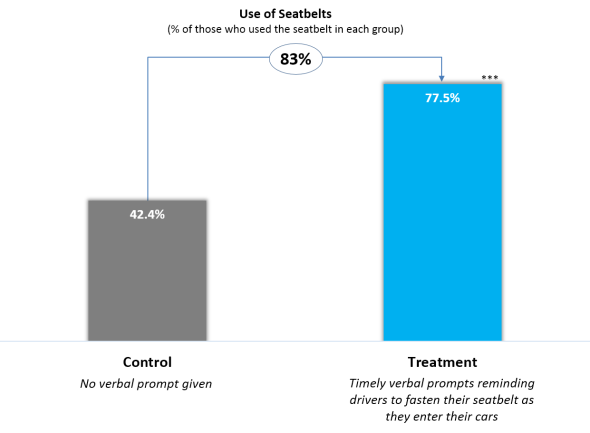Increasing Seatbelt Use

Problem
Many road accidents fatalities in Lebanon can be prevented through the use of seatbelts which reduce significantly the risk of serious injury to the head, chest, and extremities. Even after a traffic law was introduced in 2012 with expensive fines and a risk of license revoking in the case of violation, seatbelt compliance rate remained low. So was the impact of many other initiatives such as public education, information and awareness programs.
Against this background, NudgeLebanon studied the impact of behaviourally inspired verbal prompts on encouraging vehicle drivers and passengers to fasten their seatbelts.
Intervention
A pilot randomized controlled trial was implemented at Four Seasons Hotel, to examine the effect of delivering timely verbal prompts on drivers and passengers’ compliance rates. Specifically, the intervention targeted clients of the hotel who used the valet parking service.
To encourage drivers and passengers to comply with seatbelt use, Nudge Lebanon designed a nudge which consisted of having the valet parking attendants deliver a verbal prompt to drivers, reminding them to fasten their seatbelt, immediately before they enter their vehicles. Drivers in the treatment group received the verbal prompt “Be safe, please don’t forget to put on your seatbelt”, in either the English or Arabic language.
The pilot RCT was conducted for a period of 7 days, whereby a sample of 201 vehicles of clients of Four Seasons hotel that used the valet parking service was randomized into two groups of almost equal sizes:
- Control group, in which drivers interacted with valet parking attendants in a business-as-usual manner
- Treatment group, in which drivers received the verbal prompt from valet parking attendants as they entered their vehicles
Nudge Lebanon team observed and recorded the gender and seatbelt use of participants before the vehicle was in motion. In total, the behaviours of 201 drivers (99 control and 102 treatment) and 110 front seat passengers (60 control and 50 treatment) were observed.
Result and Impact
Observations of seatbelt use of drivers and front-seat passengers reveal that:
- 42.4% of drivers and 20% of passengers fastened their seatbelts in the control group, whereas
- 77.5% of drivers and 46% of passengers did so in the treatment group

(*** Statistically significant with p < 0.01)
In other words, the verbal prompt significantly increased drivers’ seatbelt compliance rate by 82.8% (significant at 1% level) and more than doubled passengers’ seatbelt use (significant at 5% level)
Additional analysis indicates that both female and male drivers exhibited a similar response to the nudge, increasing their compliance by 78.4% and 85.8%, respectively (both significant at 1% level).



